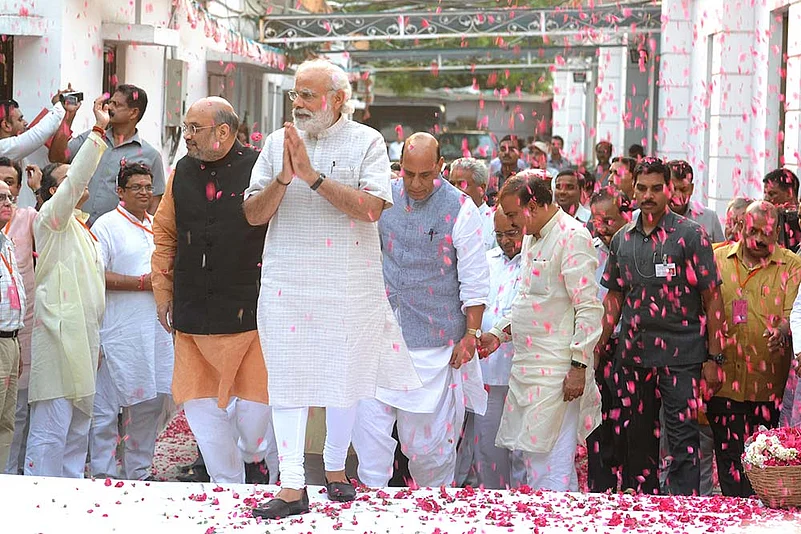Goliath & No David
- Amit Shah is now in a stronger position to implement his plans for the 2017 elections in UP
- The Congress has already conceded so much space that it can no longer lead an anti-BJP front
***
May, it seems, has become the favourite month of India’s ruling party. It was another May, two years ago, when the BJP took power at the Centre, riding on the slogan of ‘Congress-mukt Bharat’. Soon after the Lok Sabha results were announced and just before Narendra Modi took oath of office, close aides of BJP president Amit Shah, Modi’s master strategist, had already begun work on Shah’s ‘east India’ plans. In a quiet meeting in central Delhi, two days before Modi’s swearing-in, Shah’s team of young IIT-MBA graduates with experience at the World Bank, when quizzed on what next, had told this reporter, “Expansion. We are looking to expand our base in the Northeast and we must win Assam for that.” Brimming with confidence over Modi’s spectacular tally of 282 Lok Sabha seats for the BJP, these Amit Shah aides had added, “We have already started work on that. There is no time to rest with just two years to go.”
Two years since that evening, these assembly results are possibly the best anniversary gift that Modi and the BJP could have asked for. No wonder the BJP’s sweep in Assam—87 seats with its allies, Asom Gana Parishad (AGP) and Bodoland People’s Front (BPF)—resulted in a grand welcome for Shah at the party headquarters in New Delhi on Thursday. Shah’s strategy had finally paid off after the humiliation of back-to-back defeats in Delhi and Bihar. It was almost painstakingly earned.
Back in 2014, though, the BJP’s claims of seriously looking at Assam as a state it wanted to win seemed a bit like what Shakespeare called Macbeth’s “over-vaulting ambition”. Three-time Congress chief minister Tarun Gogoi seemed to be rather entrenched in the driver’s seat. With his focus on agriculture, infrastructure development and counter-insurgency, anti-incumbency was not Gogoi’s greatest worry. That overconfidence proved to be fatal.
The BJP exploited the locals-versus-migrants issue by tying up with the AGP and the BPF. It was a pragmatic, flexible line—playing down its usual themes (like beef) and finding an area of overlap on an issue of great local salience that resonated equally with its own core concerns. Five years ago, when the BJP had gone to polls alone, it lost miserably. Sources tell Outlook that even this time around the RSS had INSisted that picking regional partners would be detrimental to the BJP’s electoral health and hence it should contest on its own. BJP leaders, however, persisted with what it saw as a winning formula.
This, however, doesn’t mean the victory in Assam can be seen as a victory of the BJP alone, concede senior party leaders. Indeed, the BJP’s geographical expansion from border to border seems to follow what the RSS had always envisioned. “It is all very well to credit the BJP leadership with this victory but it is really the RSS groundwork in Assam that has paid off, just like it had in 2014,” says a senior BJP leader.
The BJP seems to have fortified its electoral self-belief with this result. But it is now clear to the powers-that-be in the party that it will do well wherever the RSS has a sound ground network. This factor in the BJP’s electoral victories has been evident in Uttar Pradesh in 2014, the Lok Sabha polls and now in Assam. It is also the deep RSS penetration in UP that the party is banking on for a turnaround in the 2017 assembly polls. In fact, the RSS has been helping the BJP with consolidation work on the ground since the state unit of the party was taken over by Keshav Maurya, its Dalit face in UP, two months ago.
Those in charge of elections in the BJP admit that the drubbing in Delhi and Bihar taught the party to not overreach its political capital and the party has learnt its lessons well. This time, the party made sure that even as Modi’s appeal was strategically used in campaigning, other senior BJP leaders were kept away from Assam. Almost all requests for appearances by senior BJP leaders from Delhi were turned down. The gamble, surely, has paid off.
“We did not make a single mistake as far as Assam is concerned,” lets on Ram Madhav, the RSS pointsman who was hands-on in drafting the blueprint. “Not a single mistake in the planning and strategising or in the last three months of campaigning.”
These elections have reinforced the party’s belief that selective polarisation pays dividends, say senior leaders in Delhi. Now that it has worked in Assam, they are hopeful of a repeat in Uttar Pradesh, where the polarisation could be even more of a determining factor.
Election managers in the northern state are busy working on the basis of a three-point understanding of the electoral situation: one, the BJP will tend to do well every time it is pitted against the Congress in any state; two, it stands little chance when confronted by regional parties as was the case in Tamil Nadu, West Bengal and Kerala; and three, regional consolidation against the Congress will have to be a focused and sustained activity in case a horizontal electoral expansion has to be made.
The broader lesson is that the Congress has already conceded so much space that it can no longer lead an anti-BJP front. A weaker Congress can make legislation and governance for the BJP easier at the Centre. Moreover, an increased voteshare in the southern states and Assam has resulted in a penetration that the BJP has long waited for.
Significantly, this new support base strengthens the authority of both the prime minister and the BJP president. This not just helps Shah in presenting a confident front in the UP polls next year but also reinforces the PM’s position and makes it easier for him to carry out the much-awaited cabinet reshuffle.
For the RSS, with its emphasis on long-term gains, this year’s assembly elections were a means to consolidate the base for the 2019 Lok Sabha polls. The gains in voteshares in Tamil Nadu, Kerala and West Bengal are, therefore, a bonus. With the PM’s pro-poor schemes like Jan Dhan Yojana, Atal Pension Yojana and Pradhan Mantri Insurance Yojana beginning to make a dent, the RSS believes it is succeeding in its long quest to be the arbiter of national destiny—2016 has brought that dream a little closer.


























